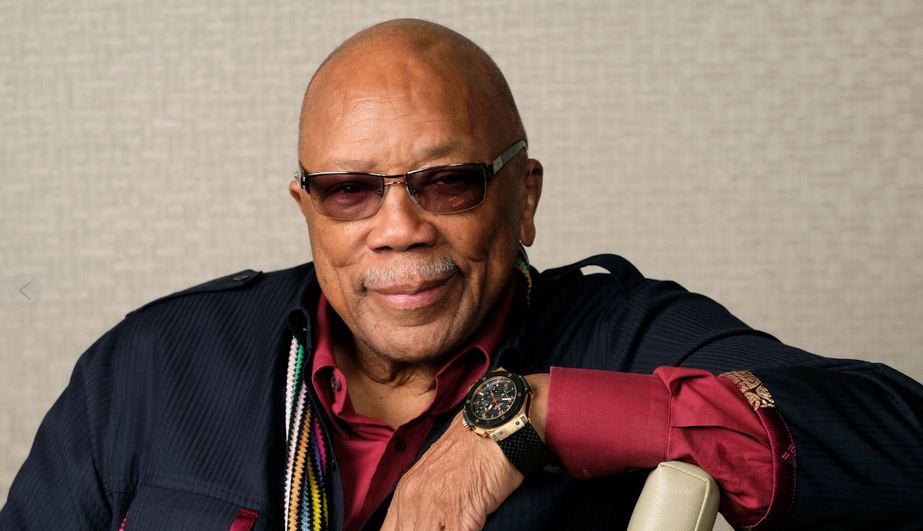
Quincy Jones, born on March 14, 1933, in Chicago, Illinois, was one of the most influential figures in the music industry, revered for his immense contributions as a musician, composer, arranger, record producer, and cultural visionary. Over the course of his career, which spanned more than seven decades, Jones left an indelible mark on genres ranging from jazz and pop to R&B and hip-hop, transforming the landscape of American music and paving the way for generations of artists. Jones won 28 Grammy Awards and numerous other honors, solidifying his place as an icon in popular culture and music history.
Early Life and Education
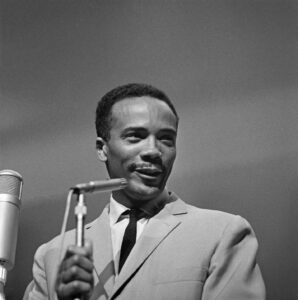
Quincy Delight Jones Jr. was raised in a challenging environment. His mother, Sarah, struggled with mental health issues, leading to her hospitalization, and his father, Quincy Sr., worked as a carpenter to support the family. When he was still a child, Jones moved with his family to Bremerton, Washington, near Seattle, where he discovered a passion for music that would ultimately shape his life. By age 10, he had taught himself to play the trumpet and piano, showing remarkable musical promise. At Garfield High School, Jones joined a jazz band and formed lasting friendships with other young musicians, including Ray Charles. These early years in Seattle laid the groundwork for his musical journey.
Early Career in Jazz and Big Band
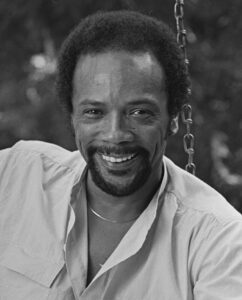
After high school, Jones won a scholarship to Seattle University, where he briefly studied before transferring to Berklee College of Music in Boston. However, he left Berklee to pursue a career as a professional musician, joining Lionel Hampton’s band as a trumpeter and arranger. This move thrust Jones into the heart of the jazz scene, where he honed his skills and developed an impressive reputation as an arranger. By the mid-1950s, he had moved to New York City, where he collaborated with legendary artists such as Count Basie, Duke Ellington, and Sarah Vaughan. His work in New York earned him acclaim and solidified his reputation as a premier arranger and conductor.
In 1957, Jones moved to Paris to study under Nadia Boulanger, a renowned composition teacher who influenced many future musical luminaries. He also became music director for Mercury Records in France, an opportunity that exposed him to the European music industry and expanded his global perspective. During his time in Europe, Jones furthered his passion for jazz, recording with his own big band and making a name for himself internationally. However, financial struggles due to the expenses of maintaining a large band forced him to disband his ensemble, and he returned to the United States in the early 1960s to explore other opportunities.
Transition to Pop and R&B
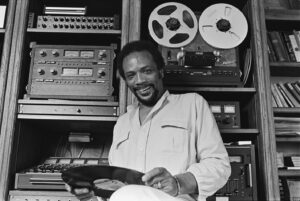
Upon his return to the U.S., Jones continued his work with Mercury Records and became the first African American executive at a major American record label when he was appointed vice president in 1964. He was instrumental in advancing the careers of many artists and began experimenting with a broader range of music styles, especially pop and R&B. His talent for blending genres and pushing musical boundaries made him an ideal collaborator for up-and-coming pop and soul artists of the era.
In the late 1960s, Jones began composing scores for film and television, becoming one of the first African American composers to break into Hollywood. He scored popular films such as In Cold Blood in 1967, The Italian Job in 1969, and The Anderson Tapes in 1971, showcasing his ability to merge jazz, pop, and orchestral music into innovative soundscapes. His scores brought a new level of sophistication to film music and helped pave the way for other Black composers in the industry.
Collaboration with Michael Jackson and Rise to Global Stardom
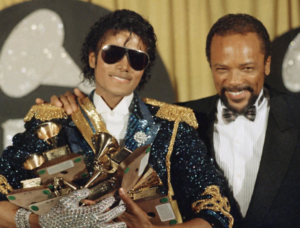
Quincy Jones’s work with Michael Jackson in the late 1970s and 1980s catapulted him to unparalleled fame. The two met on the set of The Wiz in 1978, which was a film adaptation of The Wizard of Oz featuring an all-Black cast, where Jones served as musical director. Jackson, impressed by Jones’s talent and vision, asked him to produce his next album, Off the Wall, to be released in 1979. The album was a massive success, blending disco, pop, and funk to create a fresh, groundbreaking sound. Off the Wall sold millions of copies and won Jackson his first Grammy, establishing the young artist as a global superstar.
Following the success of Off the Wall, Jones produced Jackson’s next album, Thriller, released in 1982. It went on to become the best-selling album of all time. Thriller was a cultural phenomenon, featuring hits like “Billie Jean,” “Beat It,” and the title track, which showcased Jackson’s dynamic talent and Jones’s visionary production skills. The album not only broke records but also bridged racial and cultural divides, making Jackson and Jones household names worldwide. Their final collaboration, Bad in 1987, further cemented Jones’s legacy as a producer, as it delivered multiple chart-topping singles and continued Jackson’s dominance in the pop music world.
Social Activism and Philanthropy
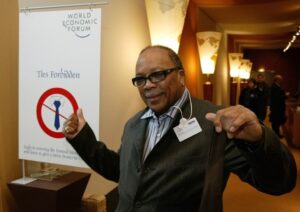
Throughout his career, Quincy Jones has been deeply committed to social activism and philanthropy. He has used his platform to address issues such as poverty, racial inequality, and AIDS awareness. In 1985, he organized and produced the charity single “We Are the World,” which brought together numerous superstar artists to raise funds for famine relief in Africa. The song became one of the best-selling singles of all time and a global anthem of unity and compassion.
Jones also founded the Quincy Jones Foundation, which supports various humanitarian causes, including youth education, global health, and arts advocacy. His commitment to giving back has been constant throughout his life, and he has leveraged his success to effect positive change in the world.
Later Career and Legacy

In the 1990s and beyond, Jones continued to influence the music industry and entertainment world. He launched Vibe magazine in 1993, which became an important platform for hip-hop and R&B culture, and he continued to mentor young artists, including producing hits for stars such as Tevin Campbell and Tamia. Jones also ventured into television, producing shows such as The Fresh Prince of Bel-Air, which became a cultural touchstone and launched the career of Will Smith.
Jones’s influence extends beyond music into a broad array of cultural and artistic spheres. His autobiography, Q: The Autobiography of Quincy Jones, was published in 2001, offering an introspective look at his life and career. In 2008, he was named a “Kennedy Center Honoree,” and in 2013, he received France’s prestigious Legion of Honor. His accolades and awards, including his 28 Grammys, make him one of the most awarded musicians of all time. In 2018, he was the subject of the acclaimed Netflix documentary Quincy, co-directed by his daughter Rashida Jones, which brought his life story and achievements to a new generation.
Influence and Contributions to Music and Culture

Quincy Jones’s contributions to music and culture are unparalleled. He worked across every major genre, from jazz and pop to soul, classical, and hip-hop, often breaking racial and cultural barriers in the process. His influence can be heard in the work of artists across generations, from Michael Jackson and Ray Charles to contemporary musicians who cite him as a major inspiration. As an African American artist and executive, Jones’s success helped pave the way for more diversity in the music and entertainment industries. His genre-defying approach and willingness to experiment have inspired countless musicians to push their creative boundaries. His collaborations with artists like Michael Jackson, Ray Charles, Aretha Franklin, and Frank Sinatra highlight his unique ability to connect with diverse talents and bring out the best in them.
Beyond his musical contributions, Jones’s philanthropy and advocacy work have made him a respected figure in the global humanitarian community. His work on We Are the World, and his foundation have made a significant impact, showcasing the power of music as a force for positive change. His commitment to education, particularly for young and disadvantaged musicians, ensures that his legacy will endure through the next generation of artists.
Personal Life and Lasting Legacy
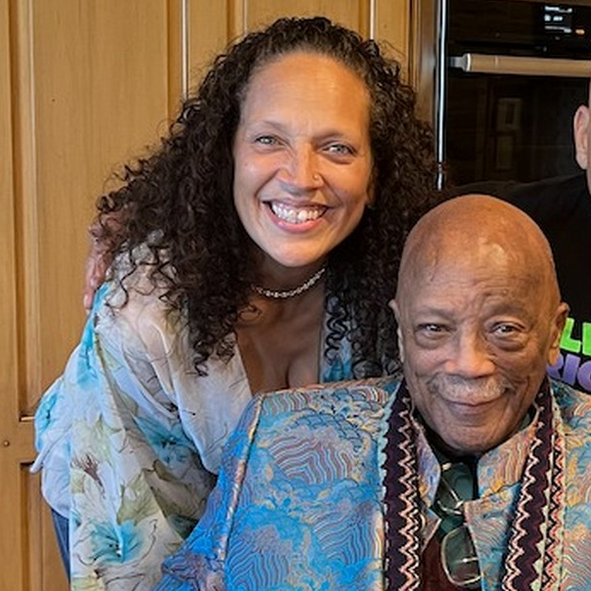
Quincy Jones was married three times, and he had seven children, many of whom have gone on to successful careers in music, film, and the arts. His daughter Rashida Jones, an actress and filmmaker, has carried on his creative legacy in her own right, and she worked alongside him on the Quincy documentary. Jones’s enduring legacy is not only in his music but in his profound influence on the entertainment industry and his contributions to social change. He transformed American popular culture, bridging genres and breaking barriers, and inspired countless musicians, producers, and fans around the world. His contributions will continue to shape the industry for decades to come, making him a true titan of American music and culture.
Quincy Jones passed away on November 3, 2024, at the age of 91. His final public statement was a post on Instagram that he shared a day earlier, on November 2nd. Along with a picture of his daughter, he very simply wrote, “Happy Birthday to my Tina Beena. So proud to be yo papa! Big hug, I love you eternally.”